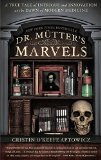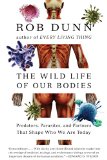Summary | Excerpt | Reviews | Beyond the book | Read-Alikes | Genres & Themes | Author Bio

The Secret Life of the Natural History Museum
by Richard ForteyFortey introduces the reader to the extraordinary people, meticulous research and driving passions that helped to create the timeless experiences of wonder that is London’s Natural History Museum.
Richard Fortey - one of the world's most gifted natural scientists and acclaimed author of Life, Trilobite and Earth - describes this splendid new book as a museum of the mind. But it is, as well, a perfect behind-the-scenes guide to a legendary place. Within its pages, London's Natural History Museum, a home of treasures - plants from the voyage of Captain Cook, barnacles to which Charles Darwin devoted years of study, hidden accursed jewels - pulses with life and miraculous surprises. In an elegant and illuminating narrative, Fortey acquaints the reader with the extraordinary people, meticulous research and driving passions that helped to create the timeless experiences of wonder that fill the museum. And with the museum's hallways and collection rooms providing a dazzling framework, Fortey offers an often eye-opening social history of the scientific accomplishments of the nineteenth, twentieth and twenty-first centuries.
Fortey’s scholarship dances with wit. Here is a book that is utterly entertaining from its first page to its last.
Fortey's passion for stewardship is convincing and comes across clearly in the way that the book's content and style mirror each other. This is not a fast-paced book to absorb in one sitting but its meticulous descriptions will please the reader who is sharply attuned to every turn of phrase. While at first glance Dry Storeroom No. 1 would appear to be of interest only to a niche audience interested in the nuances of taxonomy and other somewhat rarefied subjects, Fortey's ability to meld science and autobiography with an essayist's skill has created a book rich with trivia and anecdotes that has much to offer the casual reader. If the language is occasionally burdened by an excess of crystalline details, patience is rewarded in this tribute to the simultaneously timeless and mutable world...continued
Full Review
(493 words)
This review is available to non-members for a limited time. For full access,
become a member today.
(Reviewed by Karen Rigby).
Entomology is the scientific study of insects. Defining characteristics of insects are: three main body parts (head, thorax and abdomen), an exoskeleton and no more than 6 legs in their adult form.
"The geneticist J.B.S. Haldane remarked, when questioned by a cleric about the putative properties of God, that one sure characteristic of the Almighty would be "an inordinate fondness for beetles". Of the 1.3 million known species, about two-thirds are insects and one-fifth are beetles.
"There are an estimated twenty-eight million insect specimens in the Natural History Museum, including about a quarter of a million type specimens." (A type specimen being the definitive example of a species against which other specimens are compared).
A ...
This "beyond the book" feature is available to non-members for a limited time. Join today for full access.

If you liked Dry Storeroom No. 1, try these:

by Cristin O'Keefe Aptowicz
Published 2015
A mesmerizing biography of the brilliant and eccentric medical innovator who revolutionized American surgery and founded the country's most famous museum of medical oddities

by Rob Dunn
Published 2014
A biologist shows the influence of wild species on our well-being and the world and how nature still clings to us - and always will.
If there is anything more dangerous to the life of the mind than having no independent commitment to ideas...
Click Here to find out who said this, as well as discovering other famous literary quotes!